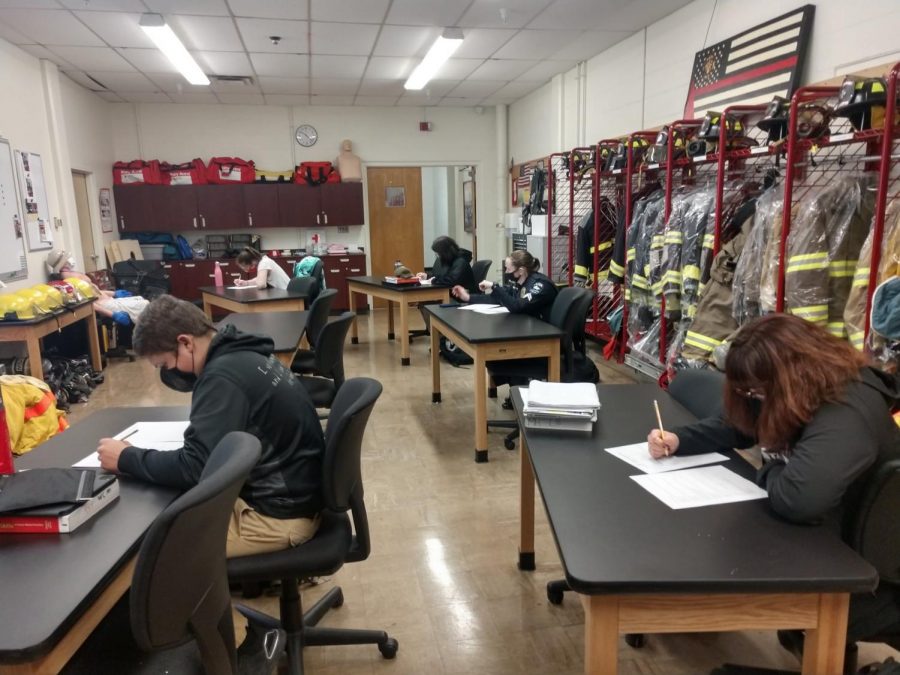How Covid has Changed Hands-on Learning within NCTC’s Programs: Part III
March 30, 2021
Part III
Cosmetology
According to the NCTC program website, in Cosmetology “students learn practical skills, such as hair cutting, braiding, coloring, highlighting, and various hairstyling techniques,” and the program gives “possibilities” for various careers as a “cosmetologist,” “[barber],” “nail artist,” “platform artist,” “spa/ salon owner” and many more.
Due to the pandemic limitations, Ashley Duncan, NCTC’s Cosmetology instructor, said, “I had to take away five standards due to the inability to partner with others. When the pandemic first began, I spent time building at-home kits for students to be able to partner with a family member to do the assignments that were not able to be done in class.”
Since NCTC has transitioned into four days a week, Duncan said, “We are still doing hands-on work, but the delivery of the information is structured differently. Most book work is done virtually on Wednesdays. The pandemic has limited what we can do in the program.”
She also spoke about her experience with obstacles she has faced due to the pandemic: “As a teacher, I am unable to help students due to not being able to be near them for long amounts of time. Demonstrations are different. [I] can’t get into a group to demonstrate what to do, I have to do it individually.”
Duncan added, “The pandemic has affected people on a social level, but as a community, we have developed new routines to keep us safe. We are here, and we are doing it.”
Public Safety And Fire Services
According to the NCTC program website, Public Safety And Fire Services is for students “interested in…volunteer[ing]” or pursuing a “career” as a “Firefighter, Emergency Medical [Technician], [Paramedic], [Fire Inspector], [Police Officer], [Border Patrol Officer]” and more. The program is focused on “hands-on training…and the importance of volunteerism.” “Students…learn about fire equipment [as well as] building and fire control [through a] First Responder and Firefighting curriculum.” Students are given the opportunity “to attend Work Based Learning” at various locations such as: “hospitals, fire departments, rescue squads, police departments and more.”
NCTC Public Safety and Fire Services instructor Mike Antoniak said, “It was hard to adapt from BFA two day[s] to Tech Center four day[s]. In the beginning, it was stressful for students and staff worried about increased exposure, but we began to get more stuff done. Students were no longer able to share materials, so I had to assign students personal gear and separate lockers.”
Additionally, sanitation has been a big priority due to the pandemic. Antoniak spoke about the changes he made due to this: “The PPE (Personal Protective Equipment) procedures have changed in a way where there is more sanitation of the equipment. We follow similar procedures you would see in a fire department.”
He added, “As a public safety teacher, I have increased my knowledge with online learning…[and] although we have increased computer networking skills, there is less time for skills and hands-on classroom learning.”
Though the pandemic has made student-teacher relationships difficult, Antoniak said, “Some families have become closer; I feel students have gained a different perspective of what family is really about.”
Automotive
According to the NCTC program website, Automotive Technology goes in-depth and provides training and experience in: “Automatic Transmission/Transaxle, annual DriveTrain and Axles, Steering and Suspension, Brakes, Engine Performance” and more. The program is for juniors and seniors, with “advanced students using cutting edge technology and equipment.” “Students…learn essential worker traits” to take with them in various “fields.”
Adam Vincellete, NCTC’s Automotive Technology instructor said, “When we came back four days a week, I kept the Blue and Green groups the same. Students that were supposed to be virtual worked in the classroom while the in-person students worked in the shop. I have tried to keep the same amount of time with book work as I do with hands-on [learning].”
Although NCTC has gone to in-person learning four days a week, Wednesdays remain virtual. “[On] Wednesdays, I do PowerPoint presentations and college presentations, so students have the chance to learn about new opportunities. The virtual learning has helped me keep going, along with my partner, [Colin] Capsey,” Vincelette said.
Additionally, Vincelette spoke about the opportunities students are given, and the possibilities it gives them as they leave the program: “Our program has a lot of outside resources such as SB2 programs; students can log in and take Ford, Toyota, etc… training programs and test out of them. The certification they earn through the training follows them, so if they wanted to work with Ford or Toyota, they would already have the training needed.”
Vincelette added, “Our work never slowed down. To me, it actually grew; a two-person team helped it all come together.”

